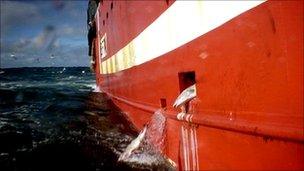Division over European Commission fish discards ban bid
- Published

The Scottish Fishermen's Federation made a warning over discards
Plans to ban discards, where fish are thrown back in to the sea by fishermen who have used up their EU catch quota, have caused division.
Fisheries Commissioner Maria Damanaki announced the plan which could impose limits on fishing.
Bertie Armstrong, chief executive of the Scottish Fishermen's Federation, said discarding was "abhorred" but a ban would be a "knee-jerk" reaction.
However, Conservative MEP Struan Stevenson welcomed the proposals.
Trawlermen have to discard fish if they have already met their EU quota.
Commissioner Damanaki proposes instead to regulate fleets through limits on fishing time and greater use of measures such as CCTV.
Before Tuesday afternoon's speech in Brussels, she told BBC Radio's Today programme action was needed urgently to end an "unacceptable" and "terrifying" practice.
She said: "Fishermen have to change attitude and they have to be persuaded that it will not go against their own interest.
"This is something I really do believe but we need time to persuade everybody and find ways to be sure that we are not going to abandon fisheries at all, as some people say. We are not going to fish less because of the ban on discarding."
The commissioner insisted time would be taken to discuss with the fishing industry to finalise proposals to replace the discards system.
She said in her speech: "Make no mistake, I am conscious of the complexity of this challenge."
Recent publicity, including Channel 4's Fish Fight featuring chef Hugh Fearnley-Whittingstall, has brought the issue to the fore.
Mr Armstrong said discarding was "the result of flawed regulations that actually requires for fish to be discarded in order to stay within the law".
He said: "The proposal from EC Fisheries Commissioner Maria Damanaki for a discards ban amounts to a draconian step too far.
"It is a knee-jerk response to populist TV coverage which has accurately described the problem, but which offers no solutions.
"The European industry despises discards, but there must be a more sensible and coherent approach.
"There is the real danger that the commissioner's proposals will undo all the innovative work that has been carried out in recent years by the Scottish fishing fleet in reducing discards."
He said this had included the use of more selective nets, and closed fishing areas.
Mr Armstrong said: "Imposing a discards ban in the near future that fails to take into account the complex operational environment of mixed fisheries that the Scottish fleet operates in could have very serious consequences for a vitally important economic sector that supports many communities around our coasts."
'Sustainable livelihood'
Scottish Fisheries Minister Richard Lochhead said: "Scotland has worked tirelessly to put the issue of fish discards on to Europe's radar and we have led the way in seeking workable solutions.
"I welcome that a process is finally under way to address the problem, even though it is deeply regrettable that Scottish knowledge will be lacking from this meeting.
"My concern now is that the EU will repeat the mistakes of the past and put in place more ill-fitting and heavy-handed legislation that won't solve the problem of discards, but make things worse."
Mr Lochhead added: "A blanket ban on discards wouldn't be effective, or enforceable in any practical way, while further limits on the time boats can spend at sea only encourages high-value stocks to be targeted and caught quickly, instead of more selective measures that protect vulnerable stocks."
Mr Stevenson, a Tory MEP, said: "Commissioner Damanaki should be congratulated for tackling the discards issue in such a decisive way.
"Now we need to see how a new 'land-all' policy can be implemented, which must be designed to protect fish stocks, while at the same time enabling our fishermen to have a sustainable livelihood."
Mr Fearnley-Whittingstall told BBC Radio Scotland's Good Morning Scotland programme there were "no easy solutions" but a ban is "one way" of dealing with problem.
He said: "It is unacceptable to fishermen, it always has been, I think partly as a result of our campaign it's now unacceptable to a large number of enthusiastic fish eating public.
"Wasting fish on this sort of scale cannot be part of good fish stock management."
- Published1 March 2011
- Published16 January 2011
- Published14 January 2011
- Published14 January 2011
- Published3 January 2011
- Published11 November 2010
- Published14 September 2010